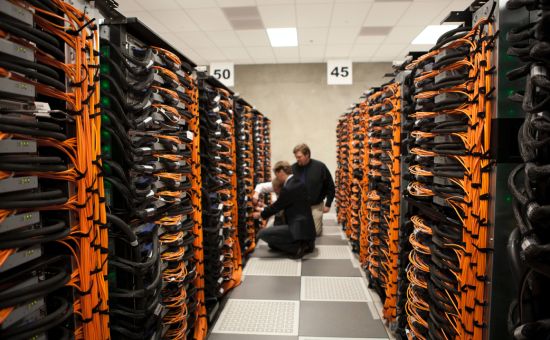The Impact of AI on Data Centers: Pros and Cons
Artificial Intelligence | May 31, 2020
In this blog talking about the impact of AI on data centers, we need to emphasize that the use of data has demonstrated a significant increase in all areas during the last few years. Many businesses are adopting a data-driven approach in order to increase the efficiency of many processes and to improve their decision-making. Data is not only a source of actionable insights but it’s also a valuable asset, which is a reason why more and more organizations start to aggressively collect data.
However, gathering data is not enough. Data should also be stored and processed, which is why the demand for data centers also grows. Organizations need data centers, and therefore they have to hire skilled employees who can monitor and maintain these data centers. As a result, running a data center becomes an expensive task, and businesses are always looking for opportunities to make the operation of data centers more cost-effective.
The Importance of Artificial Intelligence?
Artificial intelligence is a great solution for a data-driven business because it can work on various repetitive tasks and process massive amounts of data. The more data, the more effective the machine learning processes, and the more accurate AI’s decisions and predictions.
AI can increase efficiency significantly, offering a considerable competitive advantage. Gartner has stated that 30% of organizations that fail to use AI will soon lose their economic vitality. Therefore, the use of AI is not just another effective approach but rather a necessity.
Related Article: How to Win Tomorrow’s Buyers: Artificial Intelligence, the New Era of Marketing
Advantages of AI for Data Centers

Photo by Science in HD on Unsplash
1. Improved Security
One of the main problems associated with data centers is security threats. Hackers are always looking for new ways to steal data from data centers. Their malware becomes more and more advanced, and their attacks become more difficult to prevent. Recently, a data breach exposed over 772 million emails and more than 21 million passwords. Such attacks are extremely dangerous for any business because they can lead to significant losses.
A deep learning data center can analyze normal network activity and quickly detect dangerous behavior when it sees deviations from regular parameters. Besides, AI can help organizations identify security loopholes and predict possible threats so that companies will be prepared for different scenarios.
2. Reduced Downtime
Data outages can cause considerable downtimes, which is a reason why businesses hire experts who can monitor and predict such issues. However, predicting data outages is a very complex task because experts have to decode and analyze countless issues to determine the main causes of a problem.
Any task associated with the analysis of data is a perfect task for AI. AI can monitor disk utilization, power levels, network congestions, and server performance, effectively predicting data outages. AI can detect weak areas in the system and predict problems before they occur. Moreover, it can also quickly implement mitigation strategies and determine what users can be affected by such events.
3. Saving Energy
Data centers need a lot of energy, and most of this energy is consumed by cooling systems. The U.S. data centers consume more than 90 billion kilowatt-hours of electricity every year. Experts predict that energy consumption will also double in four years because of the growth of global data traffic. Businesses are constantly looking for an opportunity to reduce energy consumption, and AI has proven to be a great solution.
For instance, Google managed to decrease its data center electricity consumption by 40%, which means saving millions of dollars. AI is capable of analyzing temperature set points, identifying energy inefficiencies, and collecting critical data from sensors. This way, AI can fix such issues autonomously, reducing energy consumption at the right time.
4. Monitoring Equipment
Engineers who work in data centers need to constantly monitor equipment to detect what details need to be repaired. However, the effectiveness of monitoring can be undermined by the human factor. Human engineers can miss some issues, which can lead to equipment failures and downtimes. “It’s especially important to ensure effective monitoring so that you can fix all the deficiencies quickly before they cause significant losses,” explains Elsie Blair, an IT support specialist from a custom writing reviews website Online Writers Rating.
Thanks to pattern-based learning, AI can identify possible defects and notify engineers immediately. Besides, organizations can use data center 3D replicas to predict how any changes in the equipment will reflect on the data center’s work. Such replicas can minimize risks associated with the implementation of new approaches.
As you can see, AI offers a number of great benefits for data centers. However, there are also some challenges you should be aware of.
Disadvantages of AI for Data Centers

Photo by Science in HD on Unsplash
1. Dealing with Unforeseen Circumstances
When you want to implement new technology, it’s impossible to calculate all the outcomes and risks. Any company may face challenges that it wasn’t prepared for — this factor is also known as the “black box problem.” For instance, when using deep learning algorithms, you may not be sure about what exactly AI’s decisions are based on.
2. Most People Don’t Trust Technology
According to research, 70% of people are afraid that AI will take their jobs. As a result, it’s often difficult for IT professionals to convince executives to adopt AI-driven solutions. However, the truth is that AI can only replace humans when it comes to repetitive and time-consuming tasks. It still cannot think strategically and it doesn’t understand the context of the tasks it’s working on.
3. Entering the Job Market Can Be Difficult
Given that AI perfectly completes monotonous tasks, it can be more difficult for entry-level workers to find a job. Nevertheless, skilled professionals are still in great demand, so beginners just need to constantly learn new skills, making sure that they can deal with tasks that are difficult for AI.
Wrapping Up
AI can handle many time-consuming tasks that used to be very difficult when completed manually. Data centers use AI-driven solutions to decrease energy consumption, improve security, reduce downtime, and monitor equipment.
The main reason that reflects the impact of AI on data centers is so popular is that it can increase the overall efficiency and provide predictions that help organizations avoid potential problems.
However, the use of AI is also associated with certain challenges so you should take into account all the pros and cons of AI before using it in your data center.





